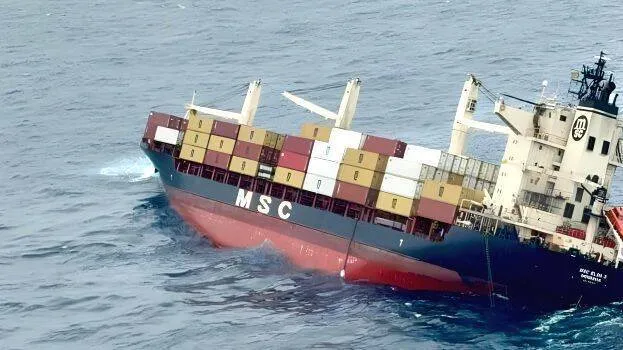

The incident involving the sinking of the vessel MSC ELSA-3 off the coast of Kochi, carrying 643 containers, raises extremely serious questions, especially concerning the hazardous materials it was transporting—now officially acknowledged by the government. Among the cargo were calcium carbide, a chemical that can react with water to produce acetylene gas and potentially cause fires, and polypropylene granules used in plastic manufacturing—both of which pose significant threats to marine ecosystems and fish resources, as per the newly revealed list. The environmental damage resulting from this incident can only be assessed through expert studies. Another major concern is the economic loss suffered by fishermen, as the chemical contamination scare has led to public reluctance to consume fish, halting sales altogether.
In cases of maritime accidents, the responsibility for compensation lies entirely with the shipping company. Territorial waters, up to 12 nautical miles from the coast, fall under the jurisdiction of individual states. However, under revised central legislation, coastal police and pollution control boards can intervene in matters extending up to 200 nautical miles, which is the nation's Exclusive Economic Zone (EEZ). This means the state government is well within its rights to initiate legal proceedings against the shipping company for the environmental damage and economic loss caused by MSC ELSA-3, which was sailing under a Liberian flag. The state government has tasked three expert committees with studying the environmental impact of the shipwreck. Only after their findings will the exact compensation amount be determined.
Since no loss of human life has been reported, it is expected that the ship’s owners—Mediterranean Shipping Company (MSC)—will attempt every possible legal tactic to avoid paying significant compensation. In order to successfully counter the company's arguments in court and secure rightful compensation, a comprehensive scientific and detailed assessment must be conducted. This should include the extent of sea water contamination, the scale of marine environmental damage, long-term effects on fish stocks, and the impact on fish consumption due to chemical pollution fears. Given Kerala's long coastline and the associated economic implications, a specialised study on the environmental and financial impact is essential.
Fishermen's organisations have also pointed to a relevant precedent: In 2020, when the Japanese vessel Wakashio ran aground near Mauritius’ Pointe d'Esny island and caused a major oil spill, nearly a thousand affected fishermen received about Rs 2 lakh each as compensation from the shipping company. Environmental experts have warned that the plastic granules in the sunken containers off Kochi could similarly have a severe long-term impact on marine life. Therefore, the compensation demand must be based on a thorough scientific evaluation of all these factors. The state must also ensure that the legal battle with the shipping company is handled by maritime law experts with extensive experience.